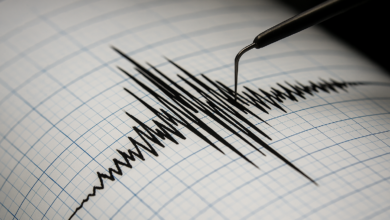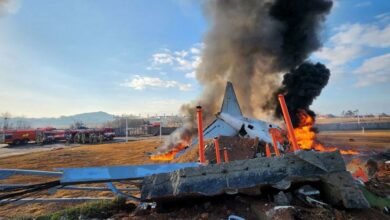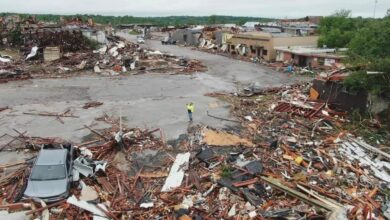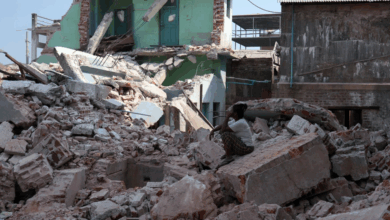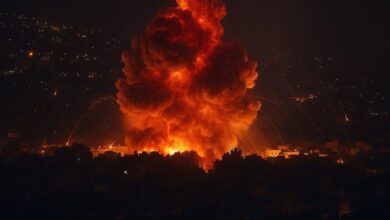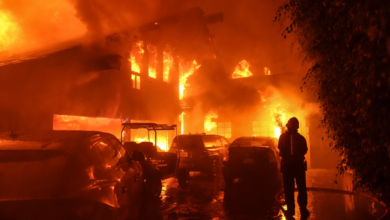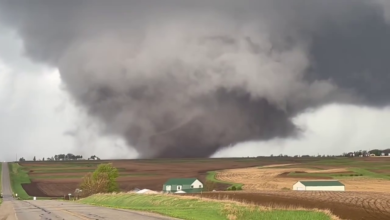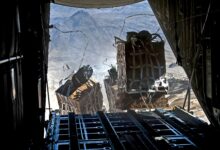Netanyahu Grapples with Fallout: Israeli Strike in Rafah

The Israeli Prime Minister, Benjamin Netanyahu, addressed concerns on Monday regarding a deadly Israeli strike in Rafah, characterizing it as a “tragic mistake.” The strike, which targeted a Hamas compound, inadvertently ignited a fire in a camp housing displaced Palestinians, resulting in significant casualties, including at least 45 fatalities, as reported by local officials.
This incident has amplified international criticism of Israel’s conduct in its conflict with Hamas, prompting condemnation even from its closest allies over civilian casualties. Despite Israel’s assertion of adherence to international law, it faces mounting scrutiny, including from top courts, with demands to cease its offensive in Rafah.
Netanyahu refrained from providing specific details about the mistake but acknowledged the launch of an investigation into the civilian deaths. The strike, occurring Sunday night, ranks among the deadliest in the ongoing conflict, contributing to a Palestinian death toll surpassing 36,000, as reported by the Gaza Health Ministry, which doesn’t differentiate between combatants and noncombatants in its count.
Addressing the Israeli parliament, Netanyahu emphasized the nation’s commitment to minimizing harm to innocent civilians while underscoring the imperative of a thorough investigation to determine the circumstances leading to the tragic incident.
Aftermath of the Rafah Assault

In a distressingly familiar scene, Palestinian families hurried to hospitals on Monday to prepare their loved ones for burial following a devastating attack on Sunday night. Tents and makeshift shelters were engulfed in flames, reminiscent of the grim realities of a conflict now in its eighth month. Amidst the chaos, women wept while men solemnly conducted prayers beside the shrouded bodies.
The assault occurred in the Tal As-Sultan neighborhood, where thousands had sought refuge after Israeli forces initiated a ground offensive in the eastern part of Rafah over two weeks prior. Health officials reported that a significant number of the deceased were women and children. Tragically, the death toll is expected to climb as some severely burned individuals remain in critical condition.
Despite a recent ruling by the top United Nations court demanding Israel cease its attacks on Rafah, the assault persisted. Israel contends that it maintains some latitude for military operations in the area.

The U.N. Security Council Convenes Amidst the Escalating Rafah Crisis

The U.N. Security Council has arranged an urgent closed-door session for Tuesday afternoon to discuss the escalating situation in Rafah. Algeria, representing the Arab bloc on the council, requested the meeting, according to two council diplomats speaking to The Associated Press ahead of the official announcement.
Rafah, located at the southern tip of Gaza, bordering Egypt, once housed over a million people, nearly half of Gaza’s population, who were displaced from other areas of the territory. However, many have been forced to flee again since Israel’s recent incursion into the region. Hundreds of thousands of people now find themselves crammed into overcrowded tent camps within and around the city.
Meanwhile, in other parts of Rafah, the Kuwait Hospital, one of the few remaining functional medical facilities, announced its closure. Dr. Suhaib al-Hamas, the hospital’s director, stated that the decision was made after two healthcare workers were killed in a strike at the hospital’s entrance on Monday. Staff members are relocating to a field hospital to continue providing medical assistance.
Prime Minister Benjamin Netanyahu insists on Israel’s need to neutralize what he claims are the last strongholds of Hamas in Rafah. Despite this, Hamas militants launched a barrage of rockets from the city towards densely populated areas in central Israel on Sunday, triggering air raid sirens but causing no injuries.
The strike on Rafah has elicited a fresh wave of condemnation, even from Israel’s staunchest supporters.
Global Outcry Over the Rafah Strike and Calls for Immediate Ceasefire
The devastating aftermath of the strike on Rafah has prompted global reactions, with the U.S. National Security Council expressing heartbreak over the “devastating images.” The council stated it is collaborating with the Israeli military and other stakeholders to ascertain the circumstances surrounding the incident.
French President Emmanuel Macron adopted a stark tone, declaring that such operations must cease immediately. He emphasized the absence of safe zones for Palestinian civilians in Rafah and called for strict adherence to international law along with an urgent ceasefire.
Germany’s Foreign Office, traditionally a steadfast supporter of Israel, described the images of charred bodies, including children, as unbearable. They stressed the imperative of swiftly clarifying the exact circumstances surrounding the airstrike and ensuring enhanced protection for civilian populations.
Qatar, a pivotal mediator in ceasefire negotiations and efforts to secure the release of hostages held by Hamas, expressed concern that the strike on Rafah could complicate ongoing talks. Negotiations, which have faced numerous setbacks, hinge on Hamas’ insistence on a lasting truce and the withdrawal of Israeli forces, terms that Israeli leaders have publicly dismissed.
Amidst the conflict, around 80% of Gaza’s population has been displaced, exacerbating severe hunger and prompting warnings of famine from U.N. officials.
Israeli Military Official Addresses Rafah Strike and Calls for Investigation and Accountability
Maj. Gen. Yifat Tomer-Yerushalmi, Israel’s military’s senior legal figure, has spoken out regarding the strike in Rafah, emphasizing that authorities are closely examining the incident. In a statement, she conveyed regret over the tragic loss of civilian lives resulting from the strike.
Speaking at an Israeli lawyers’ conference, Tomer-Yerushalmi highlighted that Israel has initiated 70 criminal investigations into potential breaches of international law, encompassing civilian deaths, conditions at detention facilities housing suspected militants, and the fatalities of inmates in Israeli custody. Investigations into property crimes and looting are also underway.
The .@IDF General Staff’s Fact-Finding and Assessment Mechanism will investigate the strike in Rafah on Sunday
— Ronen (@RonenStauber) May 27, 2024
The Military Advocate General, MG Yifat Tomer-Yerushalmi directed the General Staff’s Fact-Finding and Assessment Mechanism to investigate the strike carried out in… pic.twitter.com/jvx7h3LpTs
While Israel asserts the presence of an independent judiciary capable of investigating and prosecuting abuses, rights groups contend that Israeli authorities frequently fall short of fully probing violence against Palestinians. Even when soldiers are held accountable, the repercussions are often minimal.
Israel refutes allegations of genocide lodged against it by South Africa at the International Court of Justice. The recent court ruling ordering Israel to cease its offensive in Rafah lacks enforceability.
Separately, the chief prosecutor at the International Criminal Court is pursuing arrest warrants against Netanyahu, Israeli Defense Minister Yoav Gallant, and three Hamas leaders over alleged war crimes. The ICC intervenes when it determines that the state in question is unwilling or incapable of properly prosecuting such offenses.
Israel maintains its commitment to upholding the laws of war, citing the challenge of facing an adversary that disregards such commitments, operates within civilian areas, and refuses to unconditionally release Israeli hostages.
The war was ignited by Hamas’ attack on Israel on October 7, resulting in casualties and hostage-taking. While most hostages were released during a previous ceasefire, Hamas still holds approximately 100 hostages and the remains of around 30 others.
Read More:
Israel’s war on Gaza: Civilians Burned Alive in the Rafah Attack
Chinese Military Exercises Near Taiwan: Tensions Rise Amid PLA Maneuvers
ICC Seeks Arrest Warrants for Sinwar and Netanyahu Over War Crimes

